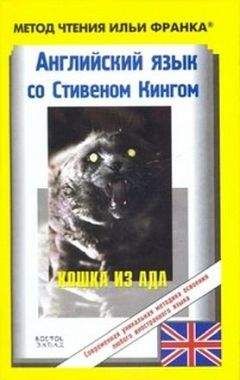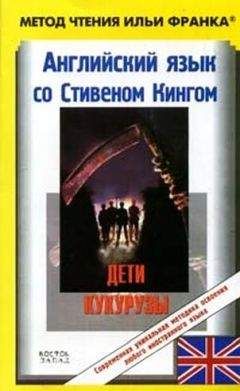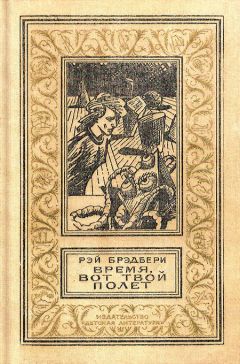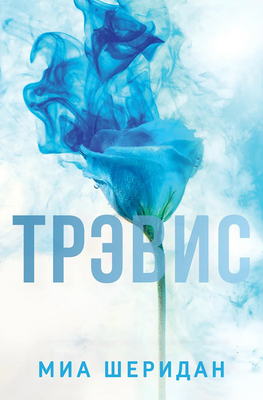Stephen King - Английский язык с Стивеном Кингом "Кадиллак» Долана"
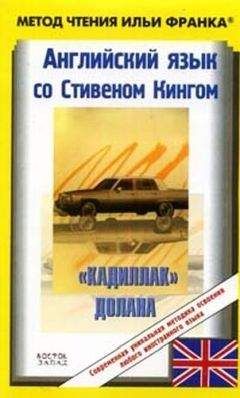
Помощь проекту
Английский язык с Стивеном Кингом "Кадиллак» Долана" читать книгу онлайн
nightmare ['naItmeq], confine [kqn'faIn], zip [zIp]
I was asleep five seconds after I zipped myself into it.
When I woke up from a nightmare I could not remember — except there had been hands in it, clutching at my throat — I found that I had been buried alive. There was sand up my nose, sand in my ears. It was down my throat, choking me.
I screamed and struggled upward, at first convinced that the confining sleeping bag was earth. Then I banged my head on the van's undercarriage and saw flakes of rust silting down.
I rolled out from under into a dawn the color of smutty pewter (я выкатился из-под /фургона/ в /занимающийся/ рассвет цвета грязного олова). My sleeping bag blew away like a tumbleweed (мой спальный мешок унесло ветром, как перекати-поле; to blow) the moment my weight was off it (как только я выбрался из него: «в тот момент, когда мой вес /вышел/ из него»). I gave a surprised yell (я удивленно вскрикнул: «выдал удивленный крик») and chased twenty feet after it (и пробежал шагов двадцать за ним; to chase — гнаться, преследовать, догонять) before realizing it would be the world's worst mistake (прежде чем я понял, что это была бы самая худшая = ужасная на свете ошибка). Visibility was down to no more than twenty yards (видимость снизилась до не более чем двадцати ярдов), and maybe less (а может быть, даже меньше). The road was totally gone in places (дорога местами совсем исчезла). I looked back at the van (я оглянулся на фургон) and it looked washed-out (он выглядел поблекшим; to wash out — смыватькраску, краситель; тускнеть), barely there (едва различимым: «едва там»), a sepia photograph of a ghost-town relic (напоминающим старую монохромную коричневую фотографию останков опустевшего города; sepia — сепия/ярко-коричневыйпигмент, выделяемыйчернильнойжелезойголовоногихмоллюсков/; монохромнаяфотографиякоричневогоцвета, напоминающегосепию; ghost — привидение, произрак).
I staggered back to it (я, пошатываясь, направился назад, к нему), found my keys (нашел свои ключи; to find), and got inside (и забрался внутрь). I was still spitting sand and coughing dryly (я все еще отплевывался песком и сухо кашлял). I got the motor going (я завел мотор) and drove slowly back the way I had come (и поехал медленно назад по пути, которым я приехал). There was no need to wait for a weather report (ни к чему было ждать прогноза погоды); the weather was all the jock could talk about this morning (все, что бы диск-жокей ни говорил о ней сегодня утром, было правдой: «погода была всем, что диск-жокей мог сказать о ней сегодня утром»). The worst desert windstorm in Nevada history (худший пустынный шторм в истории Невады). All roads closed (все дороги закрыты). Stay home unless you absolutely have to go out (оставайтесь дома, если у вас нет абсолютной необходимости выйти), and then stay home anyway (и тогда, все равно, оставайтесь дома).
smutty ['smAtI], pewter ['pjHtq], sepia ['sJpIq], relic ['relIk]
I rolled out from under into a dawn the color of smutty pewter. My sleeping bag blew away like a tumbleweed the moment my weight was off it. I gave a surprised yell and chased twenty feet after it before realizing it would be the world's worst mistake. Visibility was down to no more than twenty yards, and maybe less. The road was totally gone in places. I looked back at the van and it looked washed-out, barely there, a sepia photograph of a ghost-town relic.
I staggered back to it, found my keys, and got inside. I was still spitting sand and coughing dryly. I got the motor going and drove slowly back the way I had come. There was no need to wait for a weather report; the weather was all the jock could talk about this morning. The worst desert windstorm in Nevada history. All roads closed. Stay home unless you absolutely have to go out, and then stay home anyway.
The glorious Fourth (славное Четвертое /июля/).
Stayin(не выходи: «оставайся внутри»). You're crazy if you go out there (ты /точно/ спятил, если выйдешь туда). You'llgosandblind(ты повредишь глаза: «станешь подслеповатым»; sandblind— подслеповатый, со слабым зрением).
That I would chance (я рискну этим). This was a golden opportunity to cover it up forever (это была великолепная: «золотая» возможность навсегда спрятать /то, что здесь произошло/) — never in my wildest imaginings (никогда в своих самых диких мечтах) had I suspected I might get such a chance (я не представлял, что мне может выпасть такой шанс; to suspect — подозревать; думать, полагать, предполагать, допускать), but it was here, and I was taking it (но он мне представился, и я его принял).
I had brought three or four extra blankets (я привез три или четыре запасных одеяла; to bring). I tore a long (я оторвал длинную; to tear), wide strip from one of them (широкую полосу от одного из них) and tied it around my head (и повязал ее себе на голову: «вокруг своей головы»). Looking like some sort of crazed Bedouin, I stepped out (выглядя, как некий безумный бедуин, я вышел /из фургона/).
glorious ['glLrIqs], sandblind ['sxndblaInd], Bedouin ['beduIn]
The glorious Fourth.
Stay in. You're crazy if you go out there. You'll go sandblind.
That I would chance. This was a golden opportunity to cover it up forever -never in my wildest imaginings had I suspected I might get such a chance, but it was here, and I was taking it.
I had brought three or four extra blankets. I tore a long, wide strip from one of them and tied it around my head. Looking like some sort of crazed Bedouin, I stepped out.
I spent all morning carrying chunks of asphalt up from the ditch (я провел все утро, таская куски асфальта из кювета; to spend) and placing them back into the trench (и укладывая их назад в траншею), trying to be as neat as a mason laying a wall (стараясь быть таким же аккуратным, как каменщик, кладущий стену)... or bricking up a niche (или замуровывающий нишу). The actual fetching and carrying was not terribly difficult (на самом деле, поднимать и относить /куски асфальта/ было не так уж трудно; terribly — страшно, ужасно, ужасающе), although I had to unearth most of the asphalt blocks like an archaeologist hunting for artifacts (хотя мне приходилось выкапывать большинство асфальтовых блоков, подобно археологу в погоне за остатками материальной культуры древнего человека; earth — земля; artifact = artefact — артефакт, предмет материальной культуры /обычно предшествующих эпох/), and every twenty minutes or so (и каждые двадцать минут или около того) I had to repair to the van (мне приходилось отправляться к фургону; to repair — ремонтировать, чинить; to repair to — направляться, отправляться /куда-либо/)) to get out of the blowing sand (чтобы скрыться от хлещущего песка) and rest my stinging eyes (и дать отдых своим воспаленным глазам; stinging — жалящий, жгучий).
I worked slowly west from what had been the shallow end of the excavation (работая, я медленно продвигался на запад, от того места, где была неглубокая часть траншеи), and by quarter past noon (и к четверти первого: «к четверти после полудня) — I had started at six (я начал в шесть) — I had reached the final seventeen feet or so (я достиг последних семнадцати футов, или что-то около того). By then the wind had begun to die (к этому времени ветер начал стихать; to die — умирать; постепенноослабевать, затихать; to begin) and I could see occasional ragged patches of blue above me (и я увидел отдельные рваные клочки голубого = отдельныеголубыепросветывнебе надо мной; rag — лоскут, тряпка).
niche [nIS], archaeologist ["RkI'OlqGIst], die [daI]
I spent all morning carrying chunks of asphalt up from the ditch and placing them back into the trench, trying to be as neat as a mason laying a wall... or bricking up a niche. The actual fetching and carrying was not terribly difficult, although I had to unearth most of the asphalt blocks like an archaeologist hunting for artifacts, and every twenty minutes or so I had to repair to the van to get out of the blowing sand and rest my stinging eyes.
I worked slowly west from what had been the shallow end of the excavation, and by quarter past noon — I had started at six — I had reached the final seventeen feet or so. By then the wind had begun to die and I could see occasional ragged patches of blue above me.
I fetched and placed (я приносил и укладывал), fetched and placed (приносил и укладывал). Now I was over the spot where I calculated Dolan must be (сейчас я был над тем местом, где, по моим расчетам, должен был быть Долан; to calculate — вычислять, подсчитывать, калькулировать). Was he dead yet (мертв ли он уже)? How many cubic feet of air could a Cadillac hold (сколько кубических футов воздуха может вместить «Кадиллак»)? How soon would that space become unable to support human life (как скоро = черезкакойсрок это пространство уже не сможет: «станет не в состоянии» поддерживать человеческую жизнь; to become), assuming that neither of Dolan's two companions was still breathing (учитывая, что ни один из двух спутников Долана уже не дышал; companion — товарищ; спутник, попутчик )?

